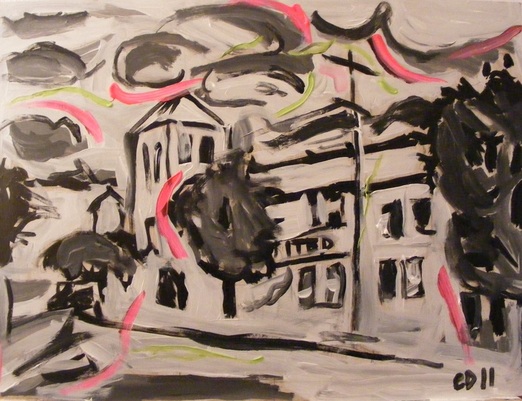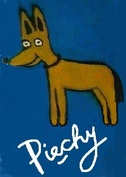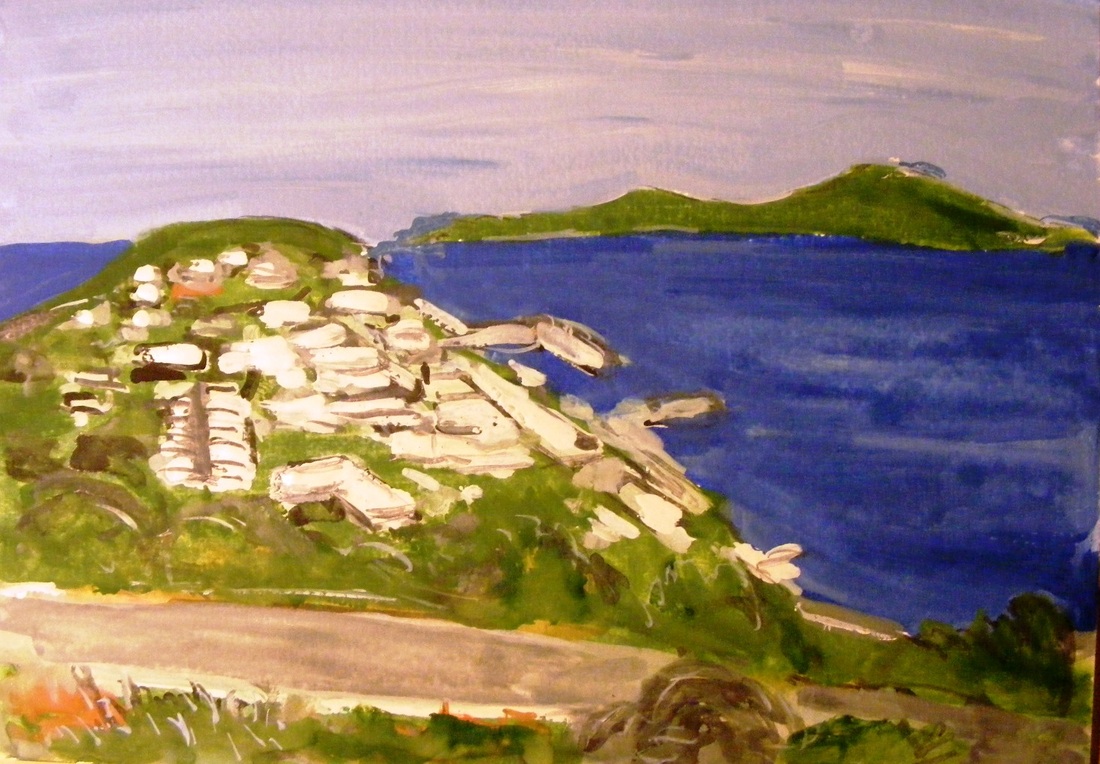|
In this chapter we meet Des who is working on secondment from the Australian Commonwealth Government, in Port Moresby. After a particularly big night at a party with a view over Port Moresby Harbour, he gets some bad news and must fly back to Melbourne. It is the early 1970's and Des, who doesn't realise it yet, is at a crossroads in his life. The novel will take the reader from Port Moresby and Melbourne in the early 1970's to Hollywood at the beginning of the twentieth century. JUMP Chapter One A Phone Call The morning light insisted itself through the curtains. Des thought of turning on the ceiling fan which sat above the bed like an aeroplane propeller. Outside the day was already underway and his hope of more sleep receded as each of his synapses clicked on. He looked out the louvred window. A patchy lawn bordered by the hibiscus hedge divided his dry dusty garden from that of his neighbours. The throbbing inside his skull continued and he thought how nice it would be if it was a cold wet Melbourne day, a Sunday perhaps, with the prospect of one of his Mum's roasts, or just sitting in the Lord Newry having a beer with the boys. A dog barked. He closed his eyes hoping to find sleep but the day kept pushing in so he lifted himself out of bed and staggered to the bathroom. The bathroom was the same as you would find in any 'govie' house - a shower in one corner with a water heater above it, lino tiled floor and a small louvred window sitting high on the wall. A sink and mirror sat waiting for his morning shave. Pulling back the shower curtain, he turned on the tap and stepped under the tumble of water, letting it hit his head. He gasped as the cold registered on his body. Now all he needed was two aspros, a chilled coke and a hamburger-with-the-lot from that place on Lygon Street and a grey Melbourne day of the type the city did so well. Blanketed by grey, a polar wind from the south, the city laid down in a grid, the buildings reflecting a civic pride he adored. He loved the stuffiness of it all. He'd jump on a tram just outside the Uni and sit back and let it carry him all the way down into the city. He'd watch the people on the footpath or catch the eye of some beauty, some lovely, lovely beauty with legs crossed and head tilted thinking girls stuff, very smart, girls; he liked his girls smart, never smarter than him. He'd never met anyone really smarter than him; in his way of being smart, which he was damn certain was not the only way to be smart. What about all the books Coll had read and the way he always beat him hands down in an argument? Dad would adjudicate and make sure Des didn't lose face. Imagine being tripped up like that! And the way Fi was smart. Now that was smart. She saw things in people. Like the time she became friends again with someone after making them a sworn enemy, a concept he still had trouble grasping. Well, you know, she says, as plain and straight as Mum would say something, feelings change. Just like that. Feelings change. He turned that around in his brain for a long time. To just let the wind hit his face and to pop into that pub with the cute barmaid who always looked at him in that way. The phone rang. Who would be ringing him this time on a Saturday morning? Surely none of the crowd from last nights party up on Turaguba Hill. They were all still in bed, I bet. He let it ring off despite its persistence. It made him think of an urgent message. A signal sent and the sender panicking when faced with the void. By now his headache and nausea had eased so he gave his body some warm water, then turned off the taps, pulled back the shower curtain, and stepped out onto the bathmat. He dried himself as he grabbed the old white icecream container, held it under the shower so as to fill it with hot water, then stepped to the small basin and began lathering the soap on his face. The phone rang again. Fuck it. He hoped whoever it was would try again later. Later, like twenty minutes later. He began to shave and when he'd finished he used the warm water to remove the shaving cream from his face. After splashing his face with cold water he began to feel much better and was once again amazed at the benefits of the cold-hot shower method which he had first developed while at Melbourne Uni and believed it to be the source of all his good health and energy. He examined his eyes and although not as fresh as a daisy he was able to forgive himself those two last beers. He knew what he needed, and he needed it fast, but he was playing it safe. He didn't want to get entangled in some dalliance that would come back and bite him on the balls. Fuck that for a joke. He certainly didn't plan to stay at the bank forever. God no. As much as he liked Barry he did not under any circumstances want to end up in his position, in a loveless marriage, a drink problem and three kids. Not that that was unusual. What about the guy at the Adcol who spent the time after his wife and kids went South scrawling little messages on the living room wall. He imagined the bloke slumped on the floor, fan beating overhead, tropical night alive outside, the whole scene lit by the flouro tubes, and him writing upwards on the wall so it looked spastic. Apparently he wrote such original things as 'Why am I here?' Oh dear. 'Don't be arrogant, Des,' his mother would say when he got that tone. He was always grateful when she said that and after a time he was able to identify the feeling. Showered and shaved, he wrapped a sarong around his torso, then went to the toilet and emptied his bladder. He then walked down the hallway, past the wooden louvred wall of the bedroom through the dim light of the living room to the kitchen. He still couldn't imagine why they gave him this four bedroom place with its mementoes of past residents: the air conditioner in the back room, the little stickers inside the wardrobe of the room. He tried to envisage what it was like to live in this house with kids. They had had no other house available and wanted to make the job attractive to him. They needed him, he figured, and, anyway, they were getting him cheap. He enjoyed this, dispassionately observing his place in the machine, deciphering the signals, interpreting the messages, reading between the lines, not taking anything personally. Somehow it reminded him of sheep following each other across the dusty paddock up the hill on the farm. Standing with Dad on the porch, with the afternoon light fading, and watching the poor fucking sheep following each other up the hill past the rock outcrop with two gum trees on either side. There was the farm, of course. When he was a kid, Dad, Mum, he , Fi and Coll lived in one section of the old farmhouse, built by his great grandfather, and Nan and Pop lived in the big part. Then after Pop died they swapped and Nan moved into the small bit and then she moved into town and there was peace across the land. No, he couldn't take over the farm. Not after Melbourne and those nights in Fitzroy and Carlton, getting pissed with the boys and dancing with that gorgeous young woman. Ah, Melbourne. He could imagine another line of work, as long as it involved numbers. Counting sheep was how he saw it, being a country boy and all. What he couldn't conceive of was the thought of not returning to Melbourne, and not buying a terrace in a nice quiet street, and not following the footy, and not meeting his mates, and not meeting a nice girl, and not having kids. Melbourne made that all seem possible. In the living room he turned the dial of fan controls to three and watched as the machine came to life. In the kitchen he opened the fridge door, lifted out the bottle of coke and Chinese takeaways from Thursday night and placed them on the benchtop. He pulled open the drawer, took a spoon and began devouring the food. He looked out onto the balcony and past that to the scene outside. It was overexposed and he was glad to be in the shady comfort of his kitchen, which he loved the moment he saw it. The phone rang. He walked through to the living room, sat on his favourite government supplied armchair and lifted the receiver. 'Hello.' 'Des?' 'Dad.' 'Des. I've got some bad news.' He felt the room tip. His father's voice sounded sad and frightened. 'Your Mum had a fall. A stroke. Last night. They are operating this afternoon.' The room and the items in it went into sharp focus. His eyes rested on the sideboard and the stack of paper on top on it. His eyeball prickled and his stomach clenched. 'She's in St. Vincent's. We were lucky to be in Melbourne. Des?' 'Yes?' 'It doesn't look good.' 'Oh.' Already he was calculating how soon he could catch a plane to Melbourne. As soon as he'd finished on the phone he would call the travel agent in town and book a ticket. 'Dad. I'll catch the earliest flight I can.' 'Good lad.' And before he knew it the wheels were clunking into the undercarriage and he was looking down at the patchwork of dry season Port Moresby and at the black strip of sealed roads and the brown lines of dirt tracks, and dominating it all, which he saw so clearly now from his pressurised eyrie, huge stretches of sea and sky. Big blocks of blue and green- blue. Resting his head against the headrest he thought about the last wenty four hours. After the phone call with his Dad he'd dressed, then driven through the hot day, past the houses and suburbs, down Three Mile Hill with the sea breeze hitting his face and the ocean right there, then in among the Saturday morning shoppers and finally into the travel agency and before he knew it he was on the TAA Sunday flight to Melbourne. He rang Barry who was very understanding and promised to keep an eye on things and told him not to worry about the big project, he would look after it, which made Des feel guilty about his thoughts that morning about Barry, and his heart flooded with gratitude for this simple human kindness. Des left a spare set of keys under the pot at the base of the back porch. The garden seemed to bid him goodbye as Barry reversed out of the driveway. Des had never been more grateful for Brry's ability to keep talking under every possible circumstance. He imagined Barry, under fire, behind enemy lines, still holding forth on the ineptitude of his superiors in Canberra. Des watched the landscape go by, the quiet Sunday landscape, as though the week has been exhausted, wrung out by Saturday night and was glad for the lie in. Small family groups, in their Sunday best, stood at the PMV stop and Des felt reassured by this image. Barry kept talking. Now he was high up in the air and Barry was probably home. Des stared out the window at the ocean and the dark line of the reef and the cars moving along the line of roads; people continuing their lives. Soon they were above the clouds and the 'no smoking' and 'fasten your seat belts' signs were switched off so people stood up and others lit cigarette. Des leaned back and closed his eyes. He felt the softness of the headrest and reached up to adjust the cold jet of air onto his face. Breathing in and breathing out the memories came rushing at him, tripping over each other to get his attention. 'You'd cut off your nose to spite your face.' Well this had proved to be one of the more astute character assessments anyone had ever made of him. There had been many an occasion when his mother's words had goaded him on, when his pride was hurt or when he was angry. Had she identified a character trait? Or had she inadvertently created one? Oh dear. He felt his eyes prickle and no matter how hard he tried the tears pushed out of the tear ducts and onto his cheeks. He took his hankerchief, unfolded it and blew his nose. Des was thankful that the flight was not even half full. The two seats next to him were empty. There was nothing to do except to let the memories roll in like mist over the mountains, shrouding everything, and turning the landscape into a white metaphor, and the gum trees a wet black. He figured this was one of those moments in his life when the mundane falls away leaving him with the tautness of his feelings and memories. Grief, they called it, and it was the first time he had been thus. Anything before this had provided no preparation, indeed was barely worth mentioning , except, perhaps as a contrast. A dear old dog, the usual aged relative (he winced now to think of the callowness of his feelings). No, nothing, really nothing at all, even vaguely compared to the tidal wave of feelings that threatened, now, to sweep him away. Düsseldorf 2010/2012
0 Comments
Your comment will be posted after it is approved.
Leave a Reply. |
Clinton De Vere
Categories
All
Archives
September 2012
|



 RSS Feed
RSS Feed